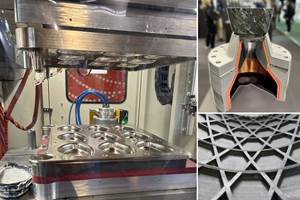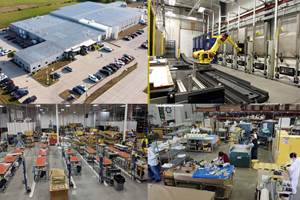Engel supports composites upcycling research at TH Rosenheim
Engel Group has provided the Rosenheim University of Applied Sciences with a vertical injection molding machine for further R&D into the processing of thermoplastic, recyclable composites and the application of natural fibers.
Professor Dr. Ing. Norbert Müller (right) and research associate Sebastian Wiedl, M.B.A & Eng. (left), with a component of the project in front of the Engel insert 500V/130 injection molding machine. Source | Engel Group
The Engel Group (Schwertberg, Austria), a European injection molding technologies manufacturer, has provided the Rosenheim University of Applied Sciences (TH Rosenheim, Germany) with a state-of-the-art injection molding cell. This system, comprising an Engel insert 500V/130 vertical injection molding machine, an Engel infrared oven and an Engel easix KR-10 articulated arm robot, is being used in the university’s teaching and research involving the processing of thermoplastic, recyclable composites, as well as the application of natural fibers.
A key research focus at TH Rosenheim is on composite materials. Its project, “Wood-Based Bioeconomy,” deals with the production and processing of new materials from cellulose fibers and polypropylene (PP). The materials developed have properties similar to organosheets and can be processed accordingly. Particularly noteworthy is the upcycling approach of the project “ZIM - ReProHybrid,” in which materials from decommissioned car bumpers are shredded and processed into new organosheets that can be back-injected via injection molding with other — also recycled — materials from bumpers.
“TH Rosenheim plays a significant role in R&D, especially in the development of sustainable injection molding solutions and new materials,” says Dr.-Ing. Johannes Kilian, head of process and application technology at the Engel Group. “The collaboration is of great importance to us, as the university is not only known for its research strength in the field of plastics processing but also for its practice-oriented education. Our injection molding cell allows for the integration of innovative technologies and digital solutions directly into teaching, as well as testing a wide range of applications for their recyclability.”
TH Rosenheim is actively engaged in research on sustainable materials, particularly in the area of natural fibers as reinforcement for thermoplastics. According to Prof. Dr.-Ing. Norbert Müller, dean of studies for the degree programs in plastics engineering and sustainable polymer technology, Engel’s technology will enable them to “conduct practical investigations and further explore the use of sustainable materials in technical applications and in construction. Construction is significant for TH Rosenheim, as it recently acquired the right to award doctorates in ‘Advanced Building Technologies.” Müller says this is a crucial sector where further R&D are needed for the recycling of materials, and where recyclable material systems based on natural fiber-reinforced plastics offer great potential for innovation.
Digitalization also plays a central role in TH Rosenheim’s research. Through the use of Engel’s iQ process observer, for example, the university is able to gather data that, through semantic processing, enables insights applicable to other uses. This represents a significant step toward machine learning and AI-supported applications in plastics processing.
“Digital process monitoring opens up new possibilities for making production processes more efficient and sustainable,” explains Müller. TH Rosenheim will continue to expand this area, as they believe the combination of digital technologies with practical projects offers high potential.
In addition to supporting teaching and third-party funded research, the Engel production cell is also used for direct R&D collaborations. Companies and institutions collaborating with TH Rosenheim can test technologies and trial new applications using this equipment.
Related Content
JEC World 2024 highlights: Thermoplastic composites, CMC and novel processes
CW senior technical editor Ginger Gardiner discusses some of the developments and demonstrators shown at the industry’s largest composites exhibition and conference.
Read MorePlant tour: Sekisui Aerospace, Orange City, Iowa, Renton and Sumner, Wash., U.S.
Veteran composites sites use kaizen and innovation culture to expand thermoplastic serial production, 4.0 digitization and new technology for diversified new markets.
Read MoreBraided thermoplastic composite H2 tanks with co-consolidated molded boss areas to fit EV battery space
BRYSON project demonstrates possible designs, automated manufacturing and low permeability concepts, including EVOH liner and novel PPA matrix.
Read MoreMFFD longitudinal seams welded, world's largest CFRTP fuselage successfully completed
Fraunhofer IFAM and partners have completed left and right welds connecting the upper and lower fuselage halves and sent the 8×4-meter full-scale section to ZAL for integration with a cabin crown module and testing.
Read MoreRead Next
Cevotec Samba Pro PV commissioned at NCC in Japan
Synergies between Cevotec, Fuji Industries, the NCC Japan, Fraunhofer IGCV and the ICC contributes to advancing knowledge exchange, FPP H2 tank development in Japanese manufacturing.
Read MoreDaher celebrates Shap’in anniversary, highlights R&D developments
Two years after its launch, Daher’s technology center has been actively pursuing its ambitions to mature aerocomposites, from thermoplastics welding to rethinking their entire life cycle.
Read MoreEngel opens new Mexico facility, expands injection molding machine production capacity
Mexico is a strategic location for Engel to achieve greater efficiency, responsiveness to market demands and a skilled workforce present and future expansion.
Read More












